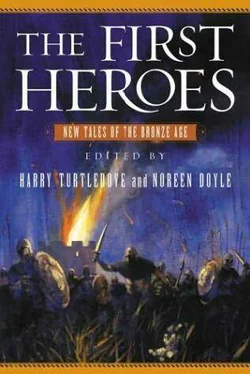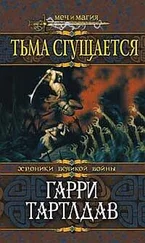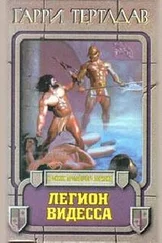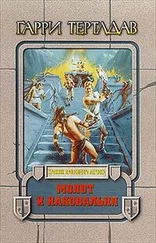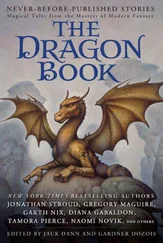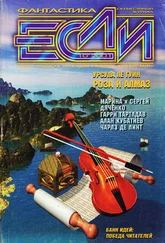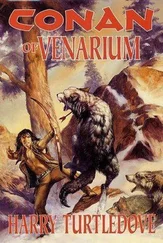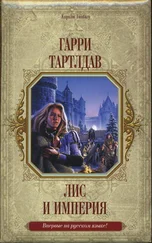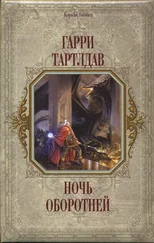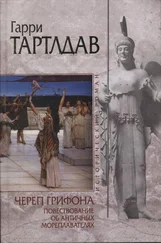Гарри Тертлдав - The First Heroes
Здесь есть возможность читать онлайн «Гарри Тертлдав - The First Heroes» весь текст электронной книги совершенно бесплатно (целиком полную версию без сокращений). В некоторых случаях можно слушать аудио, скачать через торрент в формате fb2 и присутствует краткое содержание. Жанр: Фантастика и фэнтези, на английском языке. Описание произведения, (предисловие) а так же отзывы посетителей доступны на портале библиотеки ЛибКат.
- Название:The First Heroes
- Автор:
- Жанр:
- Год:неизвестен
- ISBN:нет данных
- Рейтинг книги:3 / 5. Голосов: 1
-
Избранное:Добавить в избранное
- Отзывы:
-
Ваша оценка:
- 60
- 1
- 2
- 3
- 4
- 5
The First Heroes: краткое содержание, описание и аннотация
Предлагаем к чтению аннотацию, описание, краткое содержание или предисловие (зависит от того, что написал сам автор книги «The First Heroes»). Если вы не нашли необходимую информацию о книге — напишите в комментариях, мы постараемся отыскать её.
The First Heroes — читать онлайн бесплатно полную книгу (весь текст) целиком
Ниже представлен текст книги, разбитый по страницам. Система сохранения места последней прочитанной страницы, позволяет с удобством читать онлайн бесплатно книгу «The First Heroes», без необходимости каждый раз заново искать на чём Вы остановились. Поставьте закладку, и сможете в любой момент перейти на страницу, на которой закончили чтение.
Интервал:
Закладка:
Wonderful. The Dragon has a family.
Hupasiya promptly abandoned all thoughts of being a dragonslayer. One did not go up against an army with only one sword. Either deliver his message or die.
"O great Illuyankas, the Storm-God sends you humble greetings."
That eerie repetitive snarl could almost have been a laugh. "Indeed . . ." It was the softest, coldest whisper of sound.
"And to show you his sincerity," Hupasiya continued, keeping his voice steady, "he has invited you to a great feast in your honor, out on the mountaintop where you two once fought. Will you not join him, O mighty Illuyankas?"
He heard that eerie snarl-laugh echo in the darkness. "Warn the god of faintest breezes that I am coming."
Not only Illuyankas but his whole family followed Hupasiya out into the light. Nightmares, he thought, living nightmares, sleek and sinuous, scaled and furred, and impossible to see as any one kind of being. Hupasiya knew for the first time why even a god had been overcome.
Something so fully a thing of old Chaos has no right still existing in the world of gods and mortals.
Now, if only the gods have kept up their side of this trap ... And if only their judgment of his character is correct... It was, it was! The Dragon and his children were not wasting time on gloating or threatening.
They threw themselves on the food like so many starving creatures, gorging themselves on the meal.
Gorging themselves as well on the drugs within the food. One by one, they staggered from the feast and fell. One by one, Hupasiya bound them with rope. Only Illuyankas did not fall. The Dragon stumbled and staggered toward his lair. But he was too bloated from his meal to slip through the cave's narrow entrance. As the other gods slew the Dragon's brood, the Storm-God fell upon Illuyankas like a thunderbolt, and slew him.
Only Hupasiya did nothing. It was not a warrior's way to slay a bound captive.
I... am something other than a warrior. . . am I not? I cannot remember. "Come," Inaras told him with a purr in her voice. "I have a reward for you, my hero, a fine house here in the mountains, on a cliff overlooking all the world, balanced on the four directions, with windows facing all of the four. You shall live here and want for nothing. And perhaps, perhaps, my hero, I shall visit you. I ask only this one thing of you, a little, little thing. Do not look out of the western window. That is the window of death."
Hupasiya felt nothing. He had done the gods' bidding, he had been rewarded, and yet. . . nothing.
"I will not look out of the western window," he agreed, since that, too, meant nothing.
It was a fine house, indeed, with servants to pamper him and fill his every wish. But he had no wishes. Inaras did visit him when the whim struck her. Each time she would warn him not to gaze out of the western window. But when she left, he once again would feel nothing.
"I will not look out of the western window," Hupasiya murmured.
Why should he not? What else was there for him to do?
He threw aside the curtain covering the western window and looked out and down to the foot of the mountains. A small farm nestled down there among the fuzz of new green growth, and if he stared, he could almost see a woman . . . two children . . .
"Zaliya . . .?"
As he said her name, memory returned with a rush. His wife, his family. "Inaras!" he shouted, brushing aside the servants who tried to silence him. "Inaras!" She was before him in a rush of air. "My hero, what is wrong?"
"Let me go. I beg you, let me go!"
Inaras straightened, looming over him. "You have disobeyed me."
"Yes, I admit it. I have seen my wife and family—Inaras, Lady, Divine One, I love them! Let me go."
Her hair swirling about her, her eyes blazing with blue-white fire, Inaras shouted, "I treat you as I treat no mortal man! I give you the love of my body. And you—is this treason my repayment?"
"I am mortal, yes. I cannot live as a god. Inaras, please, you do not need me and my family does."
"They shall want for nothing ever again!"
It took him only a moment to realize the possible threat latent in that statement. The dead want for nothing. "No!" And was that why he felt . . . nothing? Was he already dead? "It doesn't matter if I am one among the dead if my family is safe. Take my life if you must—but let them live!" It took greater courage than ever it had to face down the enemy, but Hupasiya dropped to his knees, head bent, waiting for the blow that was sure to come. There was utter silence for an agonizingly long time.
"You are dead to me," Inaras said at last. "This shall not have happened."
Hupasiya stepped out of his farmhouse, then stopped dead, breathing deeply. He still looked very much like the true Hittite warrior he'd been just a few short years ago: burly and muscular, with a narrow scar like a white blaze of lightning seaming his face, although his hair had turned in one short night from black to white.
"Husband?" He turned to face Zaliya with a smile. "Smell the air, love. The springtime has come at last."
In the opening volume of S. M. Stirling's Nantucket series, the Information Age found itself confronting—and entirely surrounded by—the Late Bronze Age of the thirteenth-century B.C. Even as guns, germs, and steel (not to mention three-masted barques, radio, and a money economy) bring about a completely different kind of Iron Age in the course of the novels, no one, not even the Nantucketers, must ever underestimate the timeless power of cunning.
Blood Wolf
S. M. Stirling
His name was Kreuha Wolkwos— Blood Wolf, in the tongue of the Keruthini folk—and he was the greatest of all the warriors of his people, although still unwedded and barely old enough to raise a thick yellow down on his cheeks. Even before that fuzz sprouted he had been called a man in the korios, the war-band of the youths who spent the summer living like a wolf pack in the woods off what they could hunt and steal. Now even householders and the clan chiefs called him a man, for six heads of his taking—the oldest weathered down to a skull, the newest still ripe—were spiked to the lintel above his father's house-door. This year he had come to his full height, a finger's-span below six feet, rangy and long-limbed; agile enough to run out on the yoke-pole of a chariot while the team galloped, fast enough on his own feet to chase down deer and cut their throats with his knife. At a full run he could throw his narrow-bladed javelins through a rolling hoop of rawhide half a hundred paces distant, and in a wrestling bout few men could keep their shoulders off the ground once Blood Wolf's hands closed on them. At the Sun Festival he had thrown the sacrificial bull by its horns and then danced the night through by the side of the Spring Queen.
Two horses and eight cattle were his by soru-rechtos, booty-right, taken in lawful raids, besides sheep, bronze, cloth, and a girl who would be valuable if she lived to womanhood. Many men hated him for his toploftiness, but none had dared face him for some time. Two of those heads on his father's lintel were fellow-tribesmen, slain within the sacred wands after due challenge. His name was often spoken around the hearthfires, and all knew that—if he lived to be a householder—the ruler of the tribe, the High Reghix, would make him successor to the broad lands of his father. Then he would surely become a great chief whose name lived forever.
Right now that pride was lost in a dull misery as he scrambled to the lee side of the boat and puked helplessly, bringing up only a spatter of thin, bitter bile into an ocean that heaved gray and white with foam beneath a cold October sky of racing gray cloud.
His stomach had been empty since the first few minutes of the daylong voyage from the mainland to Alba, the White Isle. One of the boatmen pushed him aside as he adjusted a rope, and he was too weak to return a blow for the insult. Only when the fifty-foot length ceased moving beneath him did he raise his head.
Читать дальшеИнтервал:
Закладка:
Похожие книги на «The First Heroes»
Представляем Вашему вниманию похожие книги на «The First Heroes» списком для выбора. Мы отобрали схожую по названию и смыслу литературу в надежде предоставить читателям больше вариантов отыскать новые, интересные, ещё непрочитанные произведения.
Обсуждение, отзывы о книге «The First Heroes» и просто собственные мнения читателей. Оставьте ваши комментарии, напишите, что Вы думаете о произведении, его смысле или главных героях. Укажите что конкретно понравилось, а что нет, и почему Вы так считаете.
